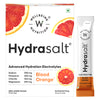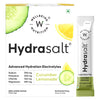We often associate hydration with simply drinking water. But here’s the truth; if the fluids you consume aren’t reaching your cells, they’re not doing nearly enough. True hydration begins at the cellular level, and that’s where the real magic of wellbeing happens.
What Exactly Is Cellular Hydration?
Your body is made up of trillions of cells, each functioning like a tiny engine powering everything from energy production to repair and regeneration. For these cellular engines to run smoothly, they need water, not just circulating in your bloodstream, but inside the cells themselves.
Cellular hydration refers to the presence of adequate water within your cells, which helps them maintain their structure and carry out essential biological functions. Your cell membranes are highly permeable to water, allowing it to move in and out freely in response to osmotic gradients—differences in solute concentration, such as sodium, on either side of the membrane.
When your body is low on water, osmotic pressure increases, and water is pulled out from inside the cells, causing them to shrink. This cellular dehydration can impair function and compromise your health over time. When you're properly hydrated, the water balance is restored, and your cells return to their optimal shape and performance.
Why Cellular Hydration Matters
Cellular hydration isn’t just about quenching thirst, it's about enabling your body to operate efficiently at the most fundamental level. When cells are hydrated, they’re better able to:
-
Support energy production
-
Aid in nutrient transport
-
Remove metabolic waste
-
Maintain temperature balance
-
Protect against oxidative stress
Poor cellular hydration, on the other hand, can compromise everything from your stamina to your long-term metabolic health.
How to Promote Optimal Cellular Hydration
Supporting hydration at the cellular level requires a bit more intention than just sipping water throughout the day. Here are three evidence-backed ways to make sure your cells get what they need:
1. Prioritize Fluid Intake
Start with the basics: drink enough fluids to replace daily losses. How much you need varies depending on your body size, physical activity, climate, and overall health. If you’re sweating more than usual, recovering from illness, or experiencing digestive distress, your fluid needs will increase significantly.
Even mild dehydration can disrupt cellular fluid balance, leading to fatigue, headaches, and poor performance. Listen to your body and drink regularly, especially during physical activity or hot weather.
2. Balance Your Electrolytes
Electrolytes are minerals, like sodium, potassium, and chloride, that regulate fluid distribution in and out of your cells by controlling osmotic pressure. Others like magnesium, calcium, phosphate, and bicarbonates also play key roles in maintaining cellular balance.
In everyday conditions, a well-rounded diet typically provides these minerals. However, during periods, high fluid loss due to heat, travel, exercise, or illness, consider replenishing with an oral rehydration solution or electrolyte-rich beverage. Look for a formula with enhanced absorption that combines all the essential minerals to support hydration.
3. Add Hydrating Foods to Your Plate
Fluids aren’t your only source of hydration. Many fruits and vegetables naturally support fluid intake thanks to their high water content. Add foods like watermelon, cucumbers, grapes, oranges, and leafy greens to your daily meals. Not only do they hydrate, but they also provide essential vitamins, antioxidants, and fiber, making them a triple win for your cells.
The Bottom Line
Hydration isn’t just about the water you drink, it’s about what happens once that water enters your body. To truly hydrate, you need to support your cells with the right balance of fluids, electrolytes, and nourishing foods.
When your cells are well-hydrated, your body can function at its best—energized, focused, and resilient. Prioritize cellular hydration as part of your daily routine, and your body will thank you in more ways than one.
FAQs
1.What’s the difference between body hydration and cellular hydration?
Body hydration refers to the overall fluid balance in your system, while cellular hydration is about how much water actually reaches and stays inside your cells, where it supports essential functions.
2.How do I know if my cells are dehydrated?
Signs of cellular dehydration include fatigue, headaches, poor concentration, dry skin, and sluggish recovery. When water isn’t effectively reaching your cells, your energy and performance often take a hit.
3.Can drinking more water alone improve hydration?
Drinking plain water helps, but without enough electrolytes or hydrating foods, it may not be fully absorbed at the cellular level. True hydration requires the right balance of fluids and minerals.
4.Do hydration supplements really work?
Yes, especially when they contain essential electrolytes like sodium, potassium, and magnesium. These help drive water into your cells and restore fluid balance, particularly after sweating, illness, or travel.
5.How long does it take to rehydrate on a cellular level?
It can take just a few hours with proper fluids and electrolytes, but depends on your hydration status, activity level, and overall health. Consistent intake supports quicker and more effective rehydration.































